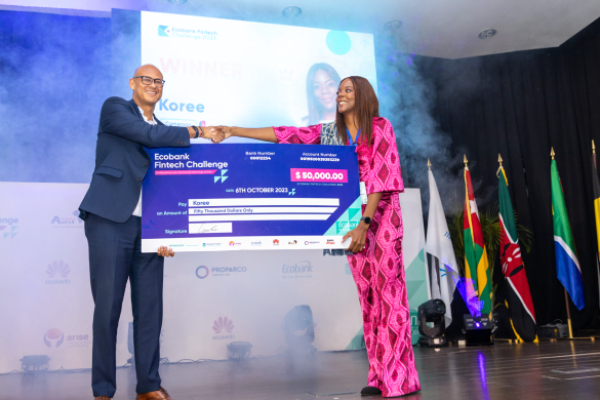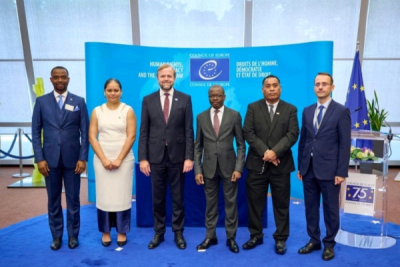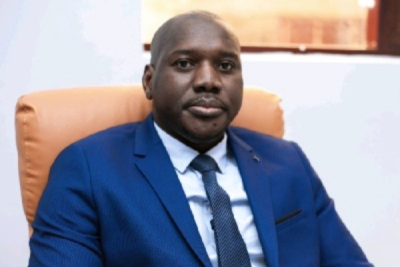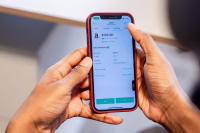On Tuesday, June 25, Beninese Minister of Digital and Digitalization, Aurélie Adam Soulé Zoumarou, inaugurated the Technical Committee for Startup Labeling. Composed of seven members appointed for a renewable two-year term, the committee will be responsible for receiving and reviewing applications from micro, small, and medium enterprises. It will periodically publish the list of labeled startups, notify applicants of the decisions resulting from the application review, and issue decisions on the revocation of granted labels.
In June 2024, Ecobank opened applications for the seventh edition of its Fintech Challenge. This competition invites both mature and startup fintech companies to collaborate with the bank for a chance to win a grand prize of $50,000. Finalists will have the opportunity to integrate their solutions into Ecobank’s network, which spans 35 African countries. Applications close on July 7, 2024.
On Thursday, June 20, Benin officially adhered to the Council of Europe Convention on Cybercrime, signed in Budapest, Hungary, in 2001. The goal is to strengthen its legal framework to enhance its cyberspace and combat cybercrime more effectively.
Trained as an urban planner, she aims to improve the quality of life for Africans. She leads a tech company that creates digital solutions for the health and finance sectors.
Scarlett Zongo, a Burkinabè tech entrepreneur, urban planner, and sustainable development consultant, is revolutionizing the lives of Burkinabè with her digital solutions. As the co-founder and CEO of Aino Digital, a tech company founded in 2019, Zongo aims to improve daily life and promote sustainable development in Africa through innovative digital services.
Aino Digital's flagship product is Sauvie, a digital identity device available as bracelets or cards with QR codes. Sauvie stores personal health information and emergency contacts, facilitating patient care in health centers and sending automatic SMS alerts to relatives in emergencies. The project won first prize at the POESAM (Orange Social Entrepreneur Prize in Africa and the Middle East) in 2022.
The startup's second product, Yelkaï, is a digital micro-savings solution that enables users to save with microfinance institutions by creating virtual accounts. Users can easily and securely save as little as 100 FCFA using electronic money.
In addition to her work at Aino Digital, Zongo founded Cité Branchée in 2016, a service and consulting firm specializing in urban planning and sustainable development, where she serves as CEO. Cité Branchée aims to promote sustainable cities in Africa.
Zongo holds a master's degree in environmental engineering from the École de technologie supérieure du Québec, obtained in 2013. She began her career in 2013 at Mobi-O, a Quebec-based sustainable mobility company, where she worked as a project manager. Upon returning to Burkina Faso, she joined the Ouagadougou City Council in 2017 as a technical advisor on environment and sustainable development. In 2022, she became a consultant for the diagnostic assessment of Ouagadougou's green belt and contributed to drafting the EXAF project: Digital Solutions for Sustainable Cities in Africa, for the Swiss Federal Institute of Technology in Lausanne.
Melchior Koba
The development of fintech startups in Africa has provided alternatives for populations excluded from traditional financial services. Thanks to these solutions, they can save or invest according to their means.
Ejara is a fintech solution developed by a Cameroonian startup, allowing users to access financial services through its mobile application. Founded in 2020 by Nelly Chatue-Diop, Baptiste Andrieux, and Tierno Tall, the Douala-based startup successfully raised $8 million in funding in 2022 to democratize access to digital investment and savings products and support its growth across the continent.
"In Africa, most people don't have the safety net of a pension fund, and some clients use Ejara for that. There are users, particularly mothers, who use the platform to invest in their children's university education. We also have a small portion of our customer base who are wholesalers, handling large volumes; they use crypto to fund and purchase goods from foreign suppliers through this method," explained Nelly Chatue-Diop.
The Ejara app is available on both iOS and Android and has already been downloaded over 100,000 times from PlayStore. After downloading, users create an account to access the startup's various services. Among other features, they can save funds and earn up to 5% annual interest or buy and sell cryptocurrencies. From Bitcoin to Tether, Ethereum to Binance Coin, the Cameroonian fintech offers Africans access to these digital currencies.
Ejara's system is based on blockchain technology, ensuring secure transactions. Additionally, the fintech has implemented a gateway that allows users to top up their digital wallets via mobile money. With just 1,000 CFA Francs (approximately $1.63), users can start saving or investing on the Cameroonian startup’s mobile platform.
"The integrated transparency and security offered by the blockchain, combined with the popularity of mobile banking services in Africa, made me realize that a mobile investment platform based on blockchain was the key to expanding financial inclusion," stated Nelly Chatue-Diop.
Adoni Conrad Quenum
After studying in France, he returned to Mali to venture into entrepreneurship. Today, he actively contributes to the financial inclusion of all segments of the African population through his fintech solution, Sama Money.
Daouda Coulibaly (photo), a Malian entrepreneur, operates in the fields of new technologies and digital finance. He is the founder and CEO of Sama Money, a tech company specializing in money transfers and mobile payments.
Founded in 2020, Sama Money's mission is to promote financial inclusion in Africa. The company offers a comprehensive range of digital payment services to individuals, businesses, and public services, including money transfers and withdrawals, payment of electricity and water bills, mobile phone top-ups, and insurance policy payments.
"This 100% Malian Fintech offers an innovative and tailored money transfer and payment solution that meets the needs of the population. Our multi-operator offering and multiple access channels ensure our services are accessible to everyone," states Daouda Coulibaly. Sama Money's services are available via the web, a mobile app, WhatsApp, and a USSD code, covering Mali, Burundi, and Côte d'Ivoire.
In addition to Sama Money, Daouda Coulibaly is the president of the Mali Fintech Association, which promotes financial inclusion in Mali, especially for those excluded from the traditional financial system. He also founded Malijet.com, a news website, in 2008, and Trainis, a professional training center he led until May 2024.
Daouda Coulibaly holds a master's degree in regional planning from Paris 1 Panthéon-Sorbonne University, obtained in 2005. He also earned an MBA from IAE France, a federation of 38 university management schools, in 2009.
Melchior Koba
The African Union Convention on Cyber Security and Personal Data Protection was adopted in 2014 in Malabo, Equatorial Guinea. Ten years later, Madagascar has joined the list of countries that have ratified it.
Last week, the Malagasy Ministry of Digital Development, Posts, and Telecommunications announced Madagascar's accession to the Malabo Convention on Cyber Security and Personal Data Protection. The aim is to ensure a safer cyberspace and effectively combat cybercrime.
With this accession, Madagascar will be able to "integrate the legal benchmarks regarding the implementation of personal data protection policies by the CMIL (Malagasy Commission for Computing and Freedoms) and the ANSSI (National Agency for the Security of Information Systems or CIRT in English)."
This move comes at a time when cybersecurity has become a crucial component due to the acceleration of digital transformation across the continent. African countries have been compelled to address this issue, and since the COVID-19 pandemic, many have expedited the ratification of the African Union Convention on Cyber Security and Personal Data Protection, adopted in 2014 in Malabo.
The Convention aims, among other things, to protect personal data within the framework of cybersecurity legislation; facilitate cooperation to ensure the security of personal data and combat digital crime by promoting information exchange between national entities; use electronic technologies to secure personal data at the national level; and combat cybercrime by establishing specific entities in each signatory country.
According to the 2020 edition of the "Global Cybersecurity Index" published by the International Telecommunication Union, Madagascar has a cybersecurity index of 23.33 and ranks 24th in Africa, just ahead of Guinea (20.53) and behind Mozambique (24.18).
It is noteworthy that Angola, Benin, Togo, Senegal, Rwanda, Namibia, Niger, Mauritius, Mozambique, Ghana, Zambia, the Democratic Republic of Congo, Cape Verde, Guinea, Ivory Coast, and Mauritania have already ratified the convention.
Adoni Conrad Quenum
Over the past five years, the African video game market has experienced rapid development. Previously almost non-existent, it has gradually gained international visibility thanks to the efforts of numerous local studios.
On Friday, June 28, the American video game publisher Xbox, owned by Microsoft, honored Cameroonian game studio Kiro’o Games. Xbox showcased an exclusive trailer on its ID@Xbox YouTube channel, which promotes the best upcoming indie games for Xbox One and Windows PC, celebrating Kiro’o Games’ 20 years of work. This promotional communication comes a month after the release of “Aurion: Legacy of the Kori-Odan,” developed by Kiro’o Games, on Xbox Series X|S and Xbox One.
The Xbox trailer highlights the evolution of Aurion from a small amateur project on RPG Maker to an independent game with beautiful hand-drawn graphics. The original game was created using the XNA framework, which was freely offered by Microsoft at the time and allowed many studios to embark on their independent ventures.
“Aurion: Legacy of the Kori-Odan” is an action-RPG set in an African Fantasy context inspired by classic J-RPGs like “Tales of.” It draws on African myths and legends, offering real-time combat in a 2D view. Players take on the role of the exiled king or queen of Zama, aiming to harness their “aurionic” power to build a world where everyone can understand each other despite their differences. The game’s narrative focuses on the challenge of remaining altruistic in a cynical and selfish world.
“We know the current situation is tough for everyone. That's precisely why we hope players will discover the Kori-Odans and be inspired by the message hidden in their Legacy and in Aurion. If you’re a humanist idealist feeling crushed by the world's coldness, Aurion is written for you,” explains Olivier Madiba, founder of Kiro’o Games and creator of Aurion.
Since 2013, the African video game industry has been growing. Across the continent, a generation of enthusiasts is mobilizing to exchange experiences and develop higher quality products. The goal is to showcase African stories and expertise. This is one of the reasons why a dozen game studios decided in February 2022 to pool their efforts within a group, the Pan Africa Gaming Group (PAGG), of which Kiro’o Games is a member.
According to consulting firm Verified Market Research, “the African video game market is growing rapidly due to the increasing adoption of smartphones, improved internet access, and a younger, tech-savvy population. Affordable mobile devices and better internet infrastructure have made online gaming more accessible to a wider range of people, increasing the demand for localized content that reflects the continent’s cultural and linguistic diversity.”
“Urbanization and rising disposable incomes have given birth to a growing middle class eager for digital entertainment, pushing game creators to offer specialized experiences to African gamers. This is expected to drive the market revenue to exceed $2.14 billion by 2024 and reach a valuation of approximately $3.72 billion by 2031,” the consulting firm adds.
For the Cameroonian studio, the confidence shown by Xbox will allow it to reach a vast potential player base worldwide, ensuring visibility, credibility, and revenue opportunities.
Muriel Edjo
The Zambian government has begun developing an artificial intelligence (AI) framework, Minister of Science and Technology, Felix Mutati announced on June 27. To this end, the government is collaborating with the Tony Blair Institute to develop an AI strategy.
With this announcement, Zambia joins a select group of African nations that are embracing AI technology.
Bamboo, the Nigerian investment app that allows users to invest in US stocks, has expanded its operations to South Africa.
Bamboo’s entry into South Africa aims to capitalize on the country’s growing interest in international investments and digital financial services. The company’s expansion is expected to boost the African fintech sector and contribute to economic development.
More...
The Chadian government has recently revived its efforts to drive digital transformation in the country. The selection of strategic partners will be critical to achieving the ambitious goals laid out in its new digital development strategy.
Chinese technology company Huawei has expressed its commitment to supporting Chad in realizing its digital projects. On Friday, June 28, Prime Minister Allah-Maye Halina received a delegation from Huawei Technologies led by its director in Chad, Feng Guo Jeremy.
The discussions focused primarily on digital projects and the improvement of information and communication technologies (ICT) in Chad. Huawei has offered to assist the government in achieving its technological development goals.
The delegation's visit comes nearly a year after the signing of a memorandum of understanding between the Chadian government and Huawei during Huawei Connect 2023. Under this agreement, Huawei committed to becoming a key partner of the Chadian government and to assist in building an ecosystem conducive to the growth of digital talents in Chad.
The support from Huawei is expected to significantly advance Chad's digital projects included in the new government's program. These projects encompass the improvement of digital infrastructure, the integration of digital technologies in the educational system, the digitization of government services, and technological innovation.
Chad currently lags significantly in the digital sector. According to DataReportal, the country had 3.2 million internet users in January 2023, representing an internet penetration rate of 17.9%. During the same period, the number of mobile phone users was 11.5 million, with a mobile penetration rate of 63.9%.
Samira Njoya
Orange continues to expand its Orange Digital Center network across the continent. Following launches in Dakar, Senegal; Bamako, Mali; Conakry, Guinea; and Freetown, Sierra Leone, Bissau, the capital of Guinea-Bissau, is now set to inaugurate this ecosystem dedicated to developing digital skills.
Orange, a leading telecom operator in Africa, has inaugurated the Orange Digital Center in Guinea-Bissau on June 28, 2024. The center, located in the capital Bissau, aims to train young people in digital skills, enhance their employability, and encourage innovative entrepreneurship.
The Orange Digital Center in Guinea-Bissau is part of a network of 26 similar centers across Africa, the Middle East, and Europe. It includes a coding school, a solidarity FabLab, a startup accelerator "Orange Fab," and is supported by Orange Ventures Africa, the group's investment fund dedicated to promising startups.
"This space is more than just a technological center; it is a promise of transformation and growth for the digital future of Guinea-Bissau and Africa. By providing free access to cutting-edge resources, we hope to inspire a new generation of creators and leaders, and contribute to an inclusive digital economy," said Brelotte Ba, Deputy CEO of Orange Africa and the Middle East.
The establishment of the Orange Digital Center in Guinea-Bissau aligns with the French telecom operator's strategy to position itself as a leader in digital transformation on the African continent. According to a World Bank report published in September 2022, the Bissau-Guinean government is committed to strengthening the country's digital skills, despite lacking the capacity to invest in the necessary resources. The absence of a national information and communication technology policy and strategy makes achieving several sustainable development goals by 2030 uncertain. Programs like Orange's help mitigate the issue while awaiting public authority actions.
Access to digital skills can improve access to basic public goods and services (e-government, telehealth, etc.), local financial services (online banking, digital payments, etc.), and promote better use of public information and digital platforms. It can also support an inclusive digital economy and contribute to the continuity of education by providing better access to distance or technology-assisted learning. As of early 2024, the internet penetration rate in Guinea-Bissau was 31.6%, according to DataReportal.
Adoni Conrad Quenum
Music holds a prominent place in Cameroon's cultural sector. Recognizing this significance, Orange has introduced initiatives to support industry stakeholders.
Orange Cameroon has relaunched its Orange Music Legends program in partnership with Cameroonian music legends. The telecommunications company announced this on Wednesday, June 26, during a press conference. This initiative aims to support and promote new musical talents across various genres.
This year, five iconic duos will be formed, each consisting of a legendary artist and a leading artist of the new generation. Together, they will revisit great hits that have resonated with multiple generations of music lovers. The event will take place on Wednesday, July 3, at the Yaoundé Multipurpose Sports Complex (Paposy).
Entrance tickets are free and can be downloaded via the Max it app, which provides access to Orange's services. The app is available on the Play Store and App Store. To download the super app Max it, click on "Marketplace," then "Event & Ticket." Select your ticket type: a free classic ticket or a VIP ticket (5,000 CFA Francs, or €7.61) for closer access to the stage. Complete your purchase and download your ticket.
Season 2 of the program promises to be even more spectacular with 24 episodes over 13 weeks, compared to 12 episodes previously. Additionally, games and quizzes will offer prizes totaling 5 million CFA Francs. The winning duo will receive 10 million CFA Francs. All votes will be cast via the Max it super app.
This initiative not only celebrates Cameroon's rich musical heritage but also supports the new generation of artists by providing them with a platform to gain recognition and collaborate with iconic figures in Cameroonian music. Alongside promoting local culture and talent, Orange Cameroon continues to innovate by offering practical digital solutions for its customers, thus reinforcing its commitment to digital transformation and support for the country's creative industries.
Samira Njoya
Across Africa, the job market is increasingly requiring individuals with strong digital knowledge and capabilities. As a result, it has become imperative to provide training to a large number of people in this critical field.
Samsung Electronics Maghreb Arab (SEMAG), the Moroccan subsidiary of the Korean technology giant Samsung, announced on Wednesday, June 26, the signing of a partnership with the Ministry of National Education, Preschool, and Sports. This initiative aims to expand their collaboration on the "Samsung Innovation Campus" (SIC) program, which promotes digital education in Morocco.
As part of this new collaboration, the SIC program will be extended to all secondary school computer science teachers for training and certification in Python programming. Additionally, the first national programming competition will be launched to encourage excellence and innovation in Python among Moroccan students.
According to the government, this partnership aligns with the objectives of the 2022-2026 Information and Communication Technology roadmap, which aims to equip teachers and students with essential skills to thrive in the digital age. For Samsung, the initiative is part of its global corporate social responsibility (CSR) strategy, which seeks to provide young people with the opportunity to learn crucial technologies and gain skills to improve their career prospects.
Since the program's launch in 2019, over 10,000 students have acquired coding skills thanks to 211 teachers across nine centers equipped with more than 500 computers and televisions. A total of 562 teachers have been trained and certified in Python programming.
This partnership brings Morocco closer to achieving the goals of the African Union's Digital Education Strategy, which advocates for the promotion of digital skills among teachers and students. The strategy also aims for at least 20% of students and 50% of teachers on the African continent to have access to digital devices by 2027, with a target of one-third of students and all teachers by 2030.
Samira Njoya















